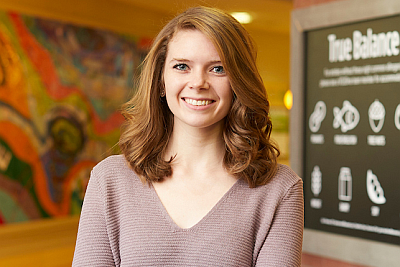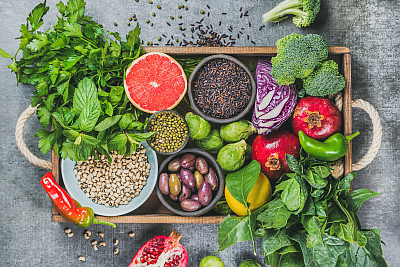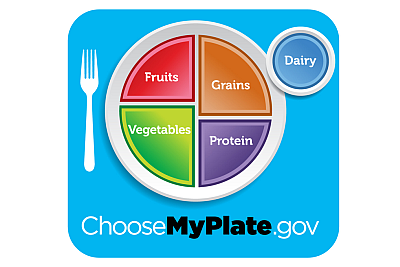Whether we’re making New Year’s resolutions or getting ready for summer vacation, doesn’t it seem like it’s always diet season? With their extreme rules and claims, and their short-term results, many weight loss and diet plans belong to a category all their own: fad diets.

“Many people out there are looking for a quick fix to lose weight, feel better, and have more energy,” says Erin Thornton, a registered dietitian nutritionist (RDN) with Aramark. “It’s very easy to buy in to these false promises.”
That’s why we asked Erin to help us find the reality behind fad diets. The big revelation? “Establishing a well-rounded foundation is going to take you farther than any fad diet ever could,” she shares.
Here’s what to watch out for, and how to pave your own way toward a healthy lifestyle.
HALLMARKS OF A FAD DIET
Fad diets are popular because they promise results without the effort required to make lifelong positive changes. The best way to avoid falling prey to these fad diets, Erin says, is to learn how to recognize them and their pitfalls. Fad diets all have one or more of the following in common.
| Characteristics of a Fad Diet | What to Watch Out For |
| Forces drastic changes to what, how much, and when you eat. | “For many people, this quickly becomes overwhelming. It’s hard to sustain too many changes to your daily habits, which often leads to yo-yo-dieting,” Erin explains. |
| Restricts you from eating one or more of the major food groups. | Over time this can lead to nutrient deficiencies and fatigue, and slow your metabolism. You may also develop an unhealthy relationship with food. |
| Labels your favorite foods as “bad” or “off limits.” | We want what we can’t have—so you end up craving those foods even more. “This can lead to overeating when you finally do let yourself have that food—which again, isn’t healthy,” says Erin. |
| Promises immediate results or rapid weight loss. | Sound too good to be true? It probably is. “Any weight loss you experience is likely due to extreme calorie restriction that, again, is unsustainable,” Erin advises. |
| Uses buzzwords like “detox” and “cleanse.” | Plain and simple: “This is marketing, not science,” advises Erin. Your body does an amazing job detoxing and cleansing itself! |
| Relies on “miracle” products like diet pills or weight-loss supplements that you must purchase. | “You don’t need to look any farther than your local farmers market or grocery store to be healthy,” Erin insists. But, if your diet is lacking in specific key nutrients from whole food intake, a multivitamin may be something to consider. |
| Claims “no exercise needed!” | This is a major red flag, according to Erin. “Exercise is a cornerstone of any healthy lifestyle.” Replacing a balanced diet and regular exercise with a short-term program can be bad for your health. |
| Endorsed by high-profile celebrities instead of reputable organizations. | “Celebrities are not trained healthcare professionals—and chances are they are being paid to pitch the product,” says Erin. |

YOUR BEST (HEALTHY) LIFE
Now that we know how to spot and avoid a fad diet, you may still be wondering: What does a healthy routine really look like? Erin’s advice is tried-and-true—and therefore will sound familiar.
- Seek balance: Choose a well-rounded diet with plenty of fruits, vegetables, lean protein, whole-grain carbohydrates, and low-fat dairy. “This is one reason why the Mediterranean diet has stood the test of time,” Erin explains. “It’s got variety, the foods are delicious, and in moderation they’re really good for you.”
- Mind portion sizes: Yes, some foods are better for you than others, but no one food group should be entirely off limits. Consider shrinking your portions or saving favorite foods for special occasions, so you don’t over-indulge.
- Never say diet: “’Diet’ is a bad word for some people,” says Erin. If you want to improve your eating, focus less on the idea of dieting and more on making one or two small changes at a time. Swap out regular soda for water, choose whole grains over refined, buy ground meat with a lower percentage of fat, and so on. Get the hang of those changes—which can take weeks, so be patient—and build up over time. “This way, your healthy habits are bound to last, whereas fad diets eventually fizzle out.”

- Work it out: A healthy lifestyle strikes a balance between what you eat and how you get moving. Physical activity can help you maintain a healthy weight, but it also relieves stress and is a great way to socialize, among many other benefits. If you’re not already exercising regularly, ask your doctor what’s right for you.
So the next time you’re tempted by the quick-fixes that most fad diets promise, remember: A balanced, healthy lifestyle will have much greater impact over time.
“You’ll know you’ve found the right mix if you can stick with it, and it’s helping you feel your best and achieve your goals—at home, at work, at school, at the gym, and beyond,” Erin asserts.
RELIABLE SOURCES
When you have questions about food and nutrition, your first instinct may be to search for answers online. But, as the saying goes, you can’t always believe everything you read. Erin points to these sources as ones you can trust. “They are backed by the authority of the government, a professional association, and a large nonprofit—and their information is based on scientific research,” she explains.
Still have questions? Make an appointment with a local RD, like Erin—“We’re here to help, and to give you one-on-one advice.”
Note: Since everyone’s health history and nutritional needs are so different, please make sure that you talk with your doctor and a registered dietitian to get advice about the diet and exercise plan that‘s right for you.


